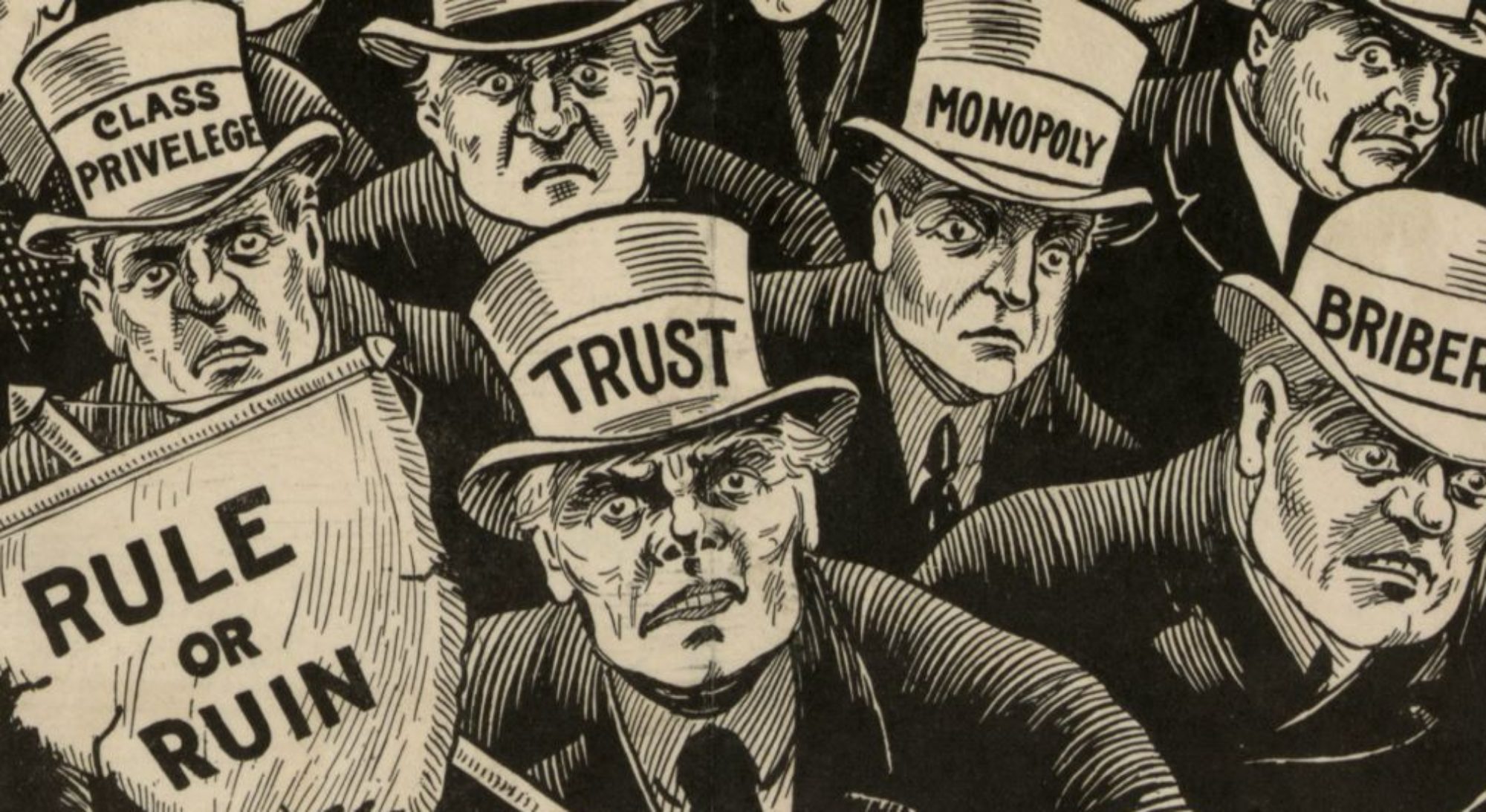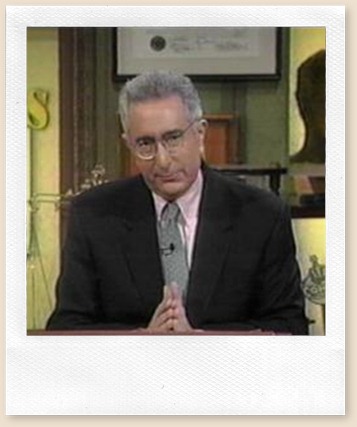
THE FEAR EXPERIMENT WORKED

Because sometimes it's serious.

In a letter written on March 19, 1944, Ayn Rand remarked: “Fascism, Nazism, Communism and Socialism are only superficial variations of the same monstrous theme—collectivism.” Rand would later expand on this insight in various articles, most notably in two of her lectures at the Ford Hall Forum in Boston: “The Fascist New Frontier” (Dec. 16, 1962, published as a booklet by the Nathaniel Branden Institute in 1963); and “The New Fascism: Rule by Consensus” (April 18, 1965, published as Chapter 20 in Capitalism: The Unknown Ideal [CUI] by New American Library in 1967).
The world conflict of today is the conflict of the individual against the state.
Rand knew better than to accept the traditional left-right dichotomy between socialism (or communism) and fascism, according to which socialism is the extreme version of left-ideology and fascism is the extreme version of right-ideology (i.e., capitalism). Indeed, in The Ayn Rand Letter (Nov. 8, 1971) she characterized fascism as “socialism for big business.” Both are variants of statism, in contrast to a free country based on individual rights and laissez-faire capitalism. As Rand put it in “Conservativism: An Obituary” (CUI, Chapter 19):
The world conflict of today is the conflict of the individual against the state, the same conflict that has been fought throughout mankind’s history. The names change, but the essence—and the results—remain the same, whether it is the individual against feudalism, or against absolute monarchy, or against communism or fascism or Nazism or socialism or the welfare state.
The placement of socialism and fascism at opposite ends of a political spectrum serves a nefarious purpose, according to Rand. It serves to buttress the case that we must avoid “extremism” and choose the sensible middle course of a “mixed economy.” Quoting from “‘Extremism,’ Or The Art of Smearing” (CUI, Chapter 17):
If it were true that dictatorship is inevitable and that fascism and communism are the two “extremes” at the opposite ends of our course, then what is the safest place to choose? Why, the middle of the road. The safely undefined, indeterminate, mixed-economy, “moderate” middle—with a “moderate” amount of government favors and special privileges to the rich and a “moderate” amount of government handouts to the poor—with a “moderate” respect for rights and a “moderate” degree of brute force—with a “moderate” amount of freedom and a “moderate” amount of slavery—with a “moderate” degree of justice and a “moderate” degree of injustice—with a “moderate” amount of security and a “moderate” amount of terror—and with a moderate degree of tolerance for all, except those “extremists” who uphold principles, consistency, objectivity, morality and who refuse to compromise.
In both of her major articles on fascism (cited above) Rand distinguished between fascism and socialism by noting a rather technical (and ultimately inconsequential) difference in their approaches to private property. Here is the relevant passage from “The New Fascism: Rule by Consensus”:
Observe that both “socialism” and “fascism” involve the issue of property rights. The right to property is the right of use and disposal. Observe the difference in those two theories: socialism negates private property rights altogether, and advocates “the vesting of ownership and control” in the community as a whole, i.e., in the state; fascism leaves ownership in the hands of private individuals, but transfers control of the property to the government.
Ownership without control is a contradiction in terms: it means “property,” without the right to use it or to dispose of it. It means that the citizens retain the responsibility of holding property, without any of its advantages, while the government acquires all the advantages without any of the responsibility.
In this respect, socialism is the more honest of the two theories. I say “more honest,” not “better”—because, in practice, there is no difference between them: both come from the same collectivist-statist principle, both negate individual rights and subordinate the individual to the collective, both deliver the livelihood and the lives of the citizens into the power of an omnipotent government —and the differences between them are only a matter of time, degree, and superficial detail, such as the choice of slogans by which the rulers delude their enslaved subjects.
Contrary to many conservative commentators during the 1960s, Rand maintained that America was drifting toward fascism, not socialism, and that this descent was virtually inevitable in a mixed economy. “A mixed economy is an explosive, untenable mixture of two opposite elements,” freedom and statism, “which cannot remain stable, but must ultimately go one way or the other” (“‘Extremism,’ or The Art of Smearing”). Economic controls generate their own problems, and with these problems come demands for additional controls—so either those controls must be abolished or a mixed economy will eventually degenerate into a form of economic dictatorship. Rand conceded that most American advocates of the welfare state “are not socialists, that they never advocated or intended the socialization of private property.” These welfare-statists “want to ‘preserve’ private property” while calling for greater government control over such property. “But that is the fundamental characteristic of fascism.”
A mixed economy is ruled by pressure groups. It is an amoral, institutionalized civil war of special interests and lobbies.
Rand gave us some of the finest analyses of a mixed economy—its premises, implications, and long-range consequences—ever penned by a free-market advocate. In “The New Fascism,” for example, she compared a mixed economy to a system that operates by the law of the jungle, a system in which “no one’s interests are safe, everyone’s interests are on a public auction block, and anything goes for anyone who can get away with it.” A mixed economy divides a country “into an ever-growing number of enemy camps, into economic groups fighting one another for self preservation in an indeterminate mixture of defense and offense.” Although Rand did not invoke Thomas Hobbes in this context, it is safe to say that the economic “chaos” of a mixed economy resembles the Hobbesian war of all against all in a state of nature, a system in which interest groups feel the need to screw others before they get screwed themselves.
A mixed economy is ruled by pressure groups. It is an amoral, institutionalized civil war of special interests and lobbies, all fighting to seize a momentary control of the legislative machinery, to extort some special privilege at one another’s expense by an act of government—i.e., by force.
Of course, Rand never claimed that America had degenerated into full-blown fascism (she held that freedom of speech was a bright line in this respect), but she did believe that the fundamental premise of the “altruist-collectivist” morality—the foundation of all collectivist regimes, including fascism—was accepted and preached by modern liberals and conservatives alike. (Those who mistakenly dub Rand a “conservative” should read “Conservatism: An Obituary” [CUI, Chapter 19], a scathing critique in which she accused conservative leaders of “moral treason.” In some respects Rand detested modern conservatives more than she did modern liberals. She was especially contemptuous of those conservatives who attempted to justify capitalism by appealing to religion or to tradition.) Rand illustrated her point in “The Fascist New Frontier,” a polemical tour de force aimed at President Kennedy and his administration.
There is no such thing as ‘the public interest’ except as the sum of the interests of individual men.
Rand began this 1962 lecture by quoting passages from the 1920 political platform of the German Nazi Party, including demands for “an end to the power of the financial interests,” “profit sharing in big business,” “a broad extension of care for the aged,” the “improvement of public health” by government, “an all-around enlargement of our entire system of public education,” and so forth. All such welfare-state measures, this platform concluded, “can only proceed from within on the foundation of “The Common Good Before the Individual Good.”
Rand had no problem quoting similar proposals and sentiments from President Kennedy and members of his administration, such as Kennedy’s celebrated remark, “And so, my fellow Americans: ask not what America will do for you—ask what you can do for your country.” The particulars of Rand’s speech will come as no surprise to those familiar with her ideas, but I wish to call attention to her final remarks about the meaning of “the public interest.” As used by Kennedy and other politicians, both Democratic and Republican, this fuzzy phrase has little if any meaning, except to indicate that individuals have a duty to sacrifice their interests for the sake of a greater, undefined good, as determined by those who wield the brute force of political power. Rand then stated what she regarded as the only coherent meaning of “the public interest.”
[T]here is no such thing as ‘the public interest’ except as the sum of the interests of individual men. And the basic, common interest of all men—all rational men—is freedom. Freedom is the first requirement of “the public interest”—not what men do when they are free, but that they are free. All their achievements rest on that foundation—and cannot exist without them.
The principles of a free, non-coercive social system are the only form of “the public interest.”
I shall conclude this essay on a personal note. Before I began preparing for this essay, I had not read some of the articles quoted above for many, many years. In fact, I had not read some of the material since my college days 45 years ago. I therefore approached my new readings with a certain amount of trepidation. I liked the articles when I first read them, but would they stand the test of time? Would Rand’s insights and arguments appear commonplace, even hackneyed, with the passage of so much time? Well, I was pleasantly surprised. Rand was exactly on point on many issues. Indeed, if we substitute “President Obama,” for “President Kennedy” or “President Johnson” many of her points would be even more pertinent today than they were during the 1960s. Unfortunately, the ideological sewer of American politics has become even more foul today than it was in Rand’s day, but Rand did what she could to reverse the trend, and one person can only do so much. And no one can say that she didn’t warn us.
Republished from Libertarianism.org.
This article was originally published on FEE.org. Read the original article.

When I first heard about the so-called raid, it turned my stomach. When I was excoriated by an enthusiastic public for not supporting the mission, or the methods, I was called “unpatriotic”. Now it turns out I was right. Anything originating with this Whitehouse is Kabuki Theater, designed solely to manipulate you and keep you passive.

Hang out in leftist internet environments, and you will discover a toxic bath of irrational hatred for the Judeo-Christian tradition. You will discover an alternate vocabulary in which Jesus is a “dead Jew on a stick” or a “zombie” and any belief is an arbitrary sham, the equivalent of a recently invented “flying spaghetti monster.” You will discover historical revisionism that posits Nazism as a Christian denomination. You will discover a rejection of the Judeo-Christian foundation of Western Civilization and American concepts of individual rights and law.
via Articles: Weekend Must-Read: Ten Reasons Why I Am No Longer a Leftist.
Christianity is not a religion, but a faith. The treatment of it as a religion has opened the door to man’s drive for power rooted in his corrupted nature. Every institution shaped by man, whether a Christian college, missionary society, “sponsoring church,” or lectureship carries in its veins the poison of power. Power and countervailing power in the secular world may be treated as a necessary evil to prevent some greater evil or achieve some modest good. But power in religion is wholly evil. We have stressed the fact that Christ at the beginning of his ministry rejected Satan’s offer of power. At the end, he refused to bow to power: No man taketh my life; I lay it down! His people were to be a commune, a koinonia of equals, each voluntarily subject to all others. And the greatest among them would be the servant of all!
Understanding a Christian’s relationship to power and authority, and how it should be exercised in the church is critical if you call yourself a Christian. Read the whole essay here.
American foreign policy can be likened to a cop running a drunk driver off the road into a tree, pulling any survivors out of the wreckage, spending a bunch of money to repair the damage to the tree, and then proclaiming that the roads are now safe for everyone!
(Oh, then buys the gas to fuel the vehicle for the next drunk driver!)
from Remarks CBS Sunday Morning – Ben Stein
 The following was written by Ben Stein and recited by him on CBS Sunday Morning Commentary.
The following was written by Ben Stein and recited by him on CBS Sunday Morning Commentary.
My confession:
I am a Jew, and every single one of my ancestors was Jewish. And it does not bother me even a little bit when people call those beautiful lit up, bejeweled trees, Christmas trees.. I don’t feel threatened. I don’t feel discriminated against. That’s what they are, Christmas trees.
It doesn’t bother me a bit when people say, ‘Merry Christmas’ to me. I don’t think they are slighting me or getting ready to put me in a ghetto. In fact, I kind of like it. It shows that we are all brothers and sisters celebrating this happy time of year. It doesn’t bother me at all that there is a manger scene on display at a key intersection near my beach house in Malibu. If people want a crèche, it’s just as fine with me as is the Menorah a few hundred yards away.
I don’t like getting pushed around for being a Jew, and I don’t think Christians like getting pushed around for being Christians. I think people who believe in God are sick and tired of getting pushed around, period. I have no idea where the concept came from, that America is an explicitly atheist country. I can’t find it in the Constitution and I don’t like it being shoved down my throat.
Or maybe I can put it another way: where did the idea come from that we should worship celebrities and we aren’t allowed to worship God as we understand Him? I guess that’s a sign that I’m getting old, too. But there are a lot of us who are wondering where these celebrities came from and where the America we knew went to.
In light of the many jokes we send to one another for a laugh, this is a little different: This is not intended to be a joke; it’s not funny, it’s intended to get you thinking.
Billy Graham’s daughter was interviewed on the Early Show and Jane Clayson asked her ‘How could God let something like this happen?’ (regarding Hurricane Katrina).. Anne Graham gave an extremely profound and insightful response. She said, ‘I believe God is deeply saddened by this, just as we are, but for years we’ve been telling God to get out of our schools, to get out of our government and to get out of our lives. And being the gentleman He is, I believe He has calmly backed out. How can we expect God to give us His blessing and His protection if we demand He leave us alone?’
In light of recent events… terrorists attack, school shootings, etc. I think it started when Madeleine Murray O’Hare (she was murdered, her body found a few years ago) complained she didn’t want prayer in our schools, and we said OK. Then someone said you better not read the Bible in school.. The Bible says thou shalt not kill; thou shalt not steal, and love your neighbor as yourself. And we said OK.
Then Dr. Benjamin Spock said we shouldn’t spank our children when they misbehave, because their little personalities would be warped and we might damage their self-esteem (Dr. Spock’s son committed suicide). We said an expert should know what he’s talking about. And we said okay….
Now we’re asking ourselves why our children have no conscience, why they don’t know right from wrong, and why it doesn’t bother them to kill strangers, their classmates, and themselves.
Probably, if we think about it long and hard enough, we can figure it out. I think it has a great deal to do with ‘WE REAP WHAT WE SOW.’
Funny how simple it is for people to trash God and then wonder why the world’s going to hell. Funny how we believe what the newspapers say, but question what the Bible says. Funny how you can send ‘jokes’ through e-mail and they spread like wildfire, but when you start sending messages regarding the Lord, people think twice about sharing.. Funny how lewd, crude, vulgar and obscene articles pass freely through cyberspace, but public discussion of God is suppressed in the school and workplace.
Are you laughing yet?
Funny how when you forward this message, you will not send it to many on your address list because you’re not sure what they believe, or what they will think of you for sending it.
Funny how we can be more worried about what other people think of us than what God thinks of us.
Pass it on if you think it has merit.
If not, then just discard it… no one will know you did. But, if you discard this thought process, don’t sit back and complain about what bad shape the world is in.
My Best Regards, Honestly and respectfully,
Ben Stein
From Hitler to Pinochet and beyond, history shows there are certain steps that any would-be dictator must take to destroy constitutional freedoms. And, argues Naomi Wolf, George Bush and his administration seem to be taking them all
Naomi Wolf
Tuesday April 24, 2007
Guardian
Last autumn, there was a military coup in Thailand. The leaders of the coup took a number of steps, rather systematically, as if they had a shopping list. In a sense, they did. Within a matter of days, democracy had been closed down: the coup leaders declared martial law, sent armed soldiers into residential areas, took over radio and TV stations, issued restrictions on the press, tightened some limits on travel, and took certain activists into custody.
They were not figuring these things out as they went along. If you look at history, you can see that there is essentially a blueprint for turning an open society into a dictatorship. That blueprint has been used again and again in more and less bloody, more and less terrifying ways. But it is always effective. It is very difficult and arduous to create and sustain a democracy – but history shows that closing one down is much simpler. You simply have to be willing to take the 10 steps.
As difficult as this is to contemplate, it is clear, if you are willing to look, that each of these 10 steps has already been initiated today in the United States by the Bush administration.
Read the rest of the article: http://www.guardian.co.uk/print/0,,329789179-103680,00.html